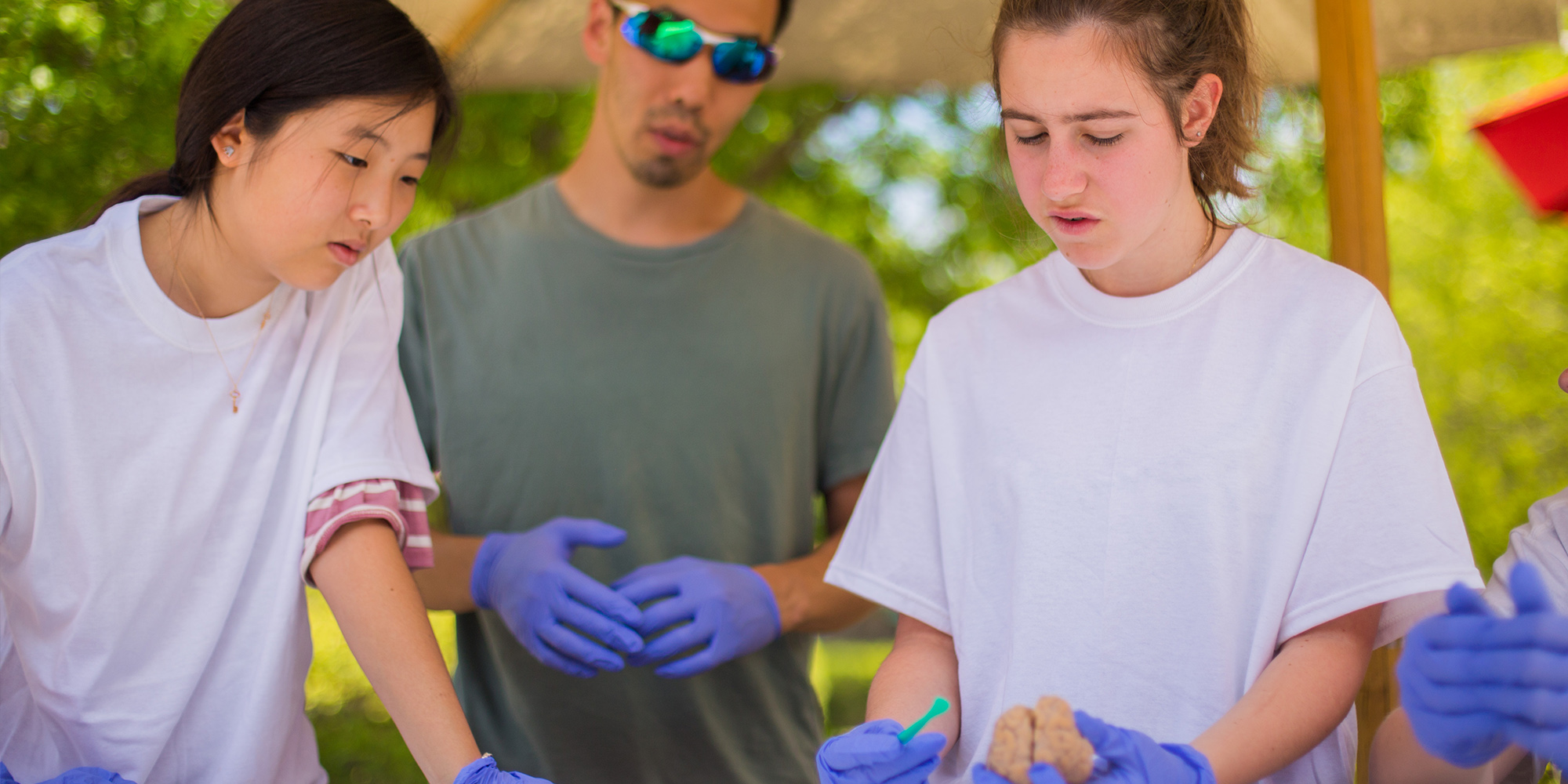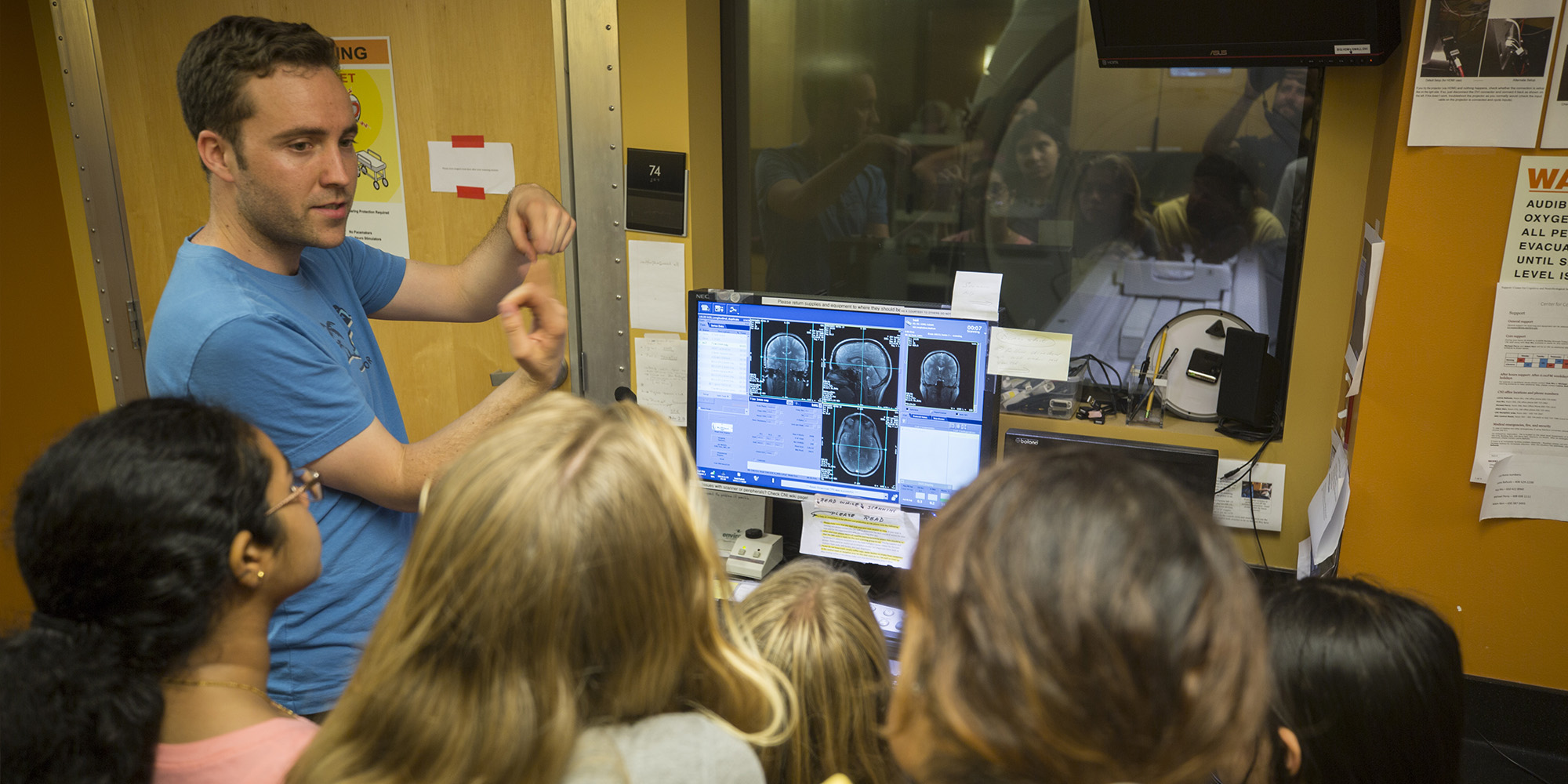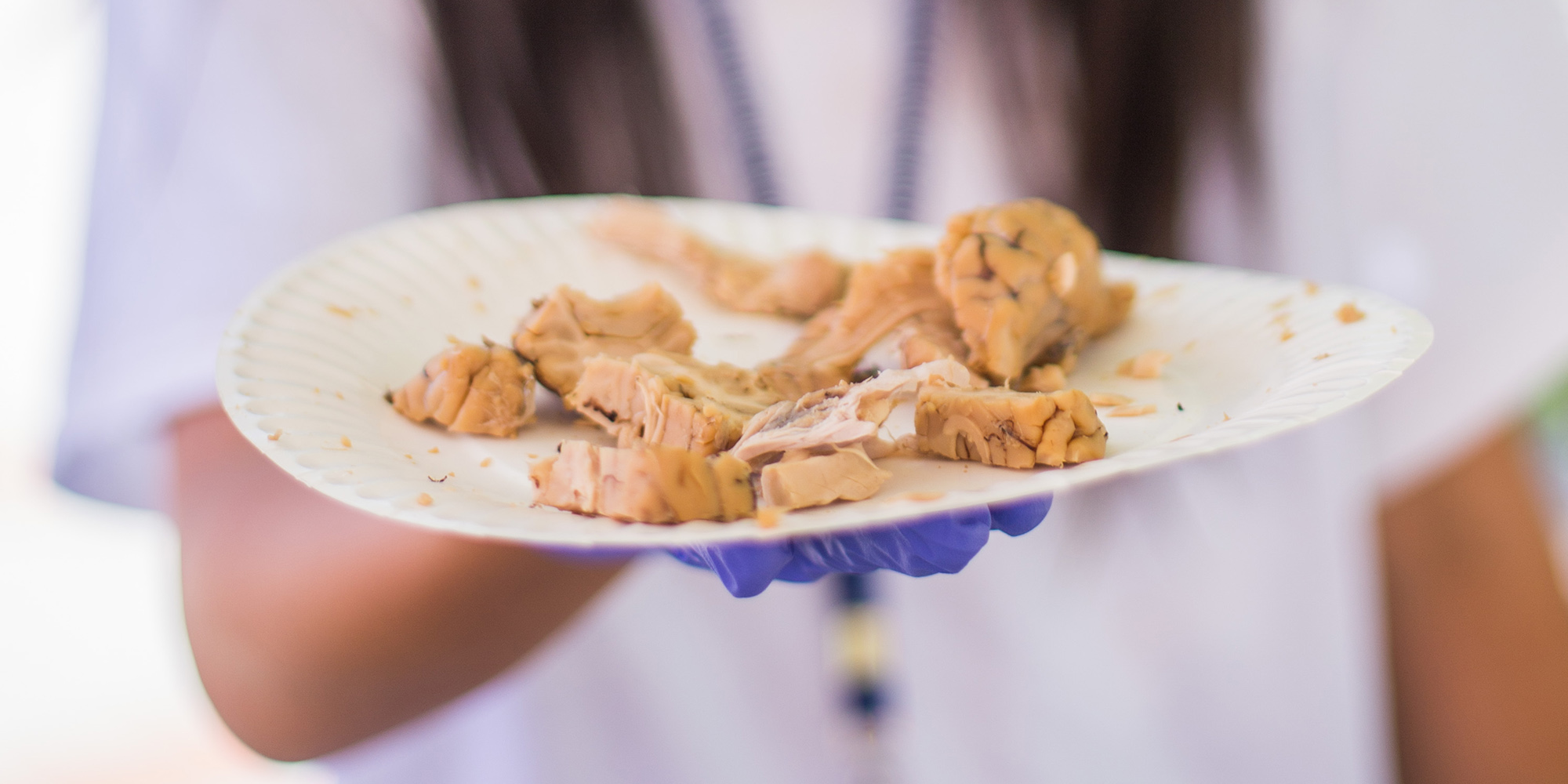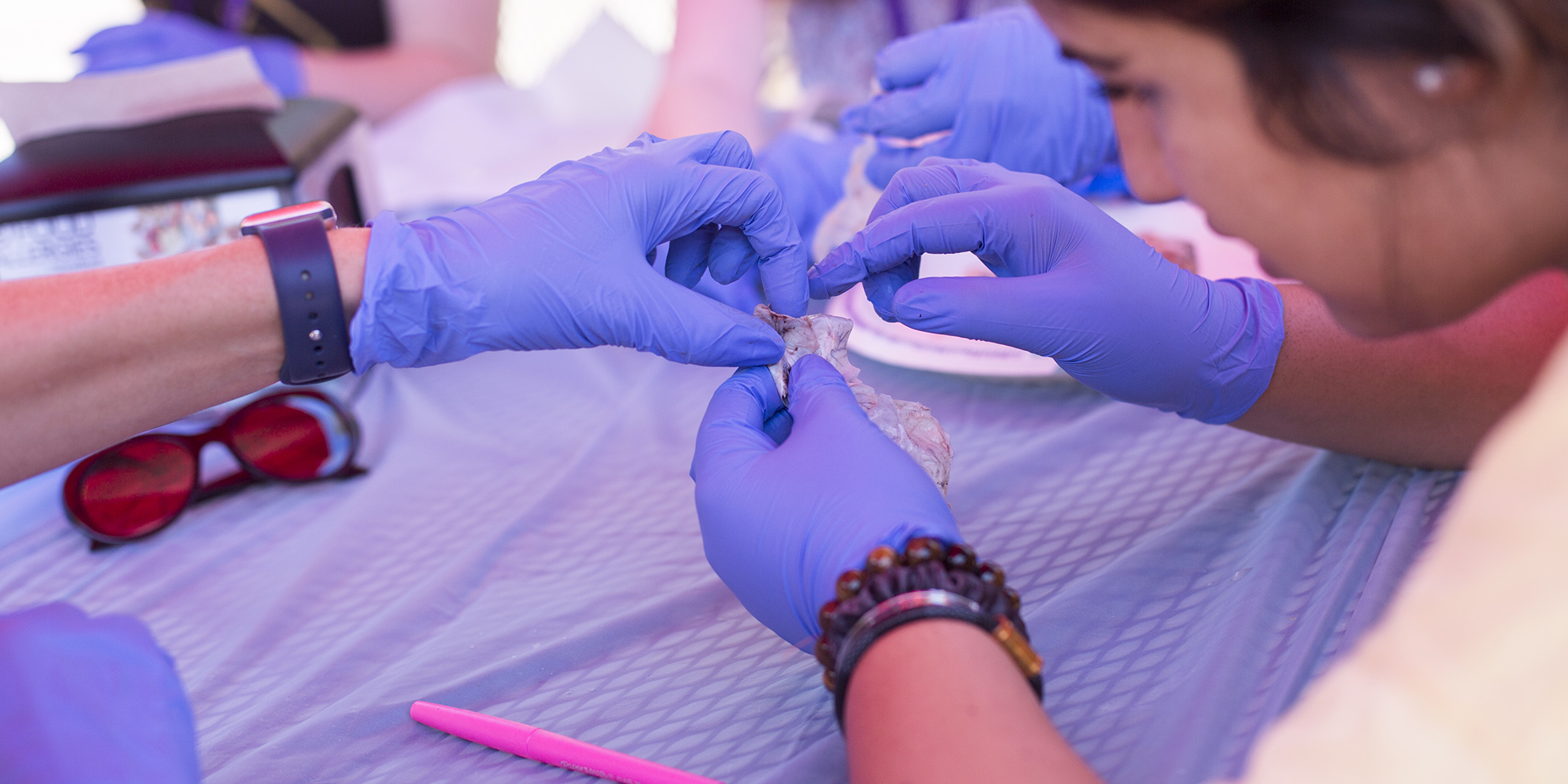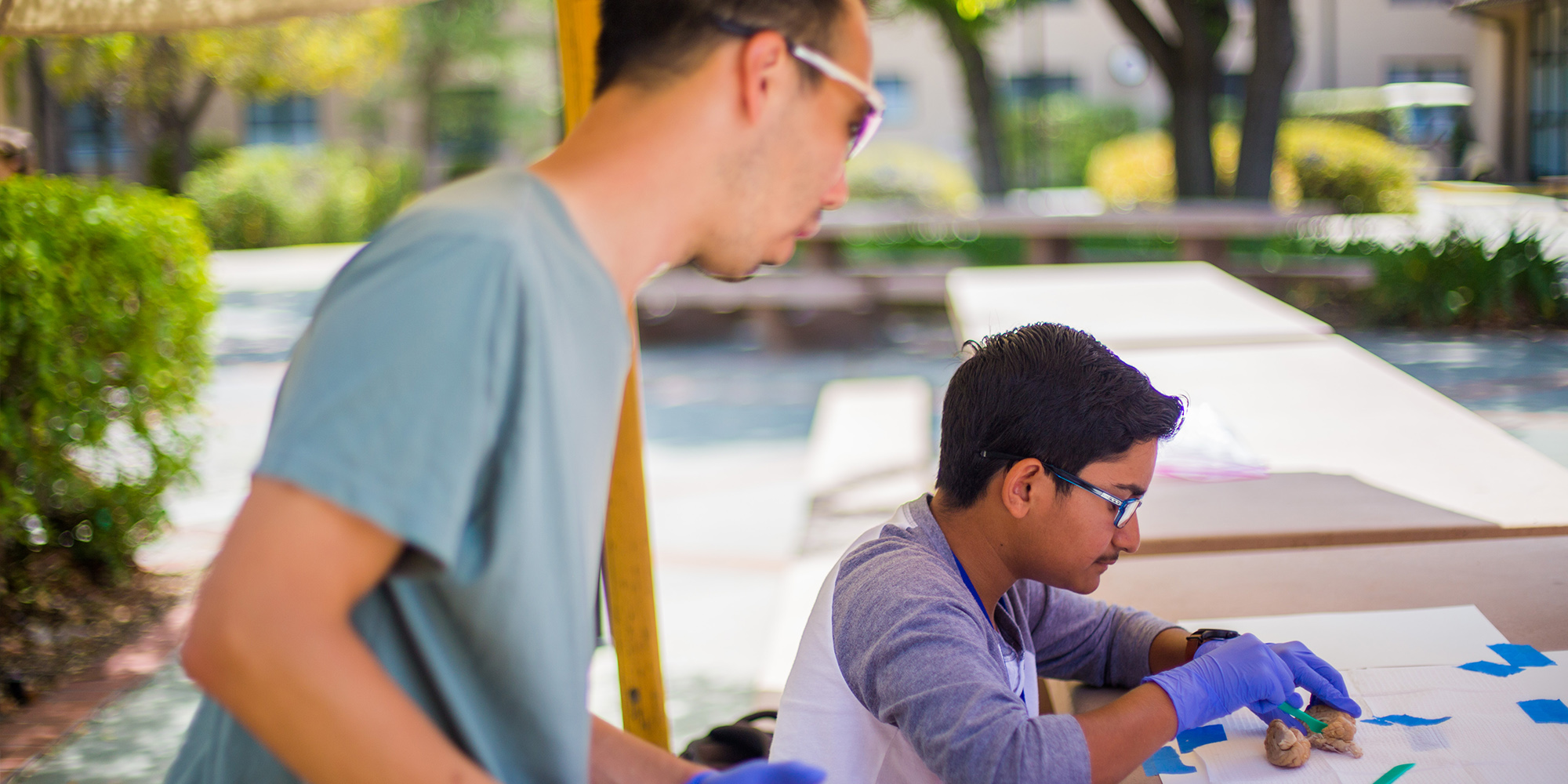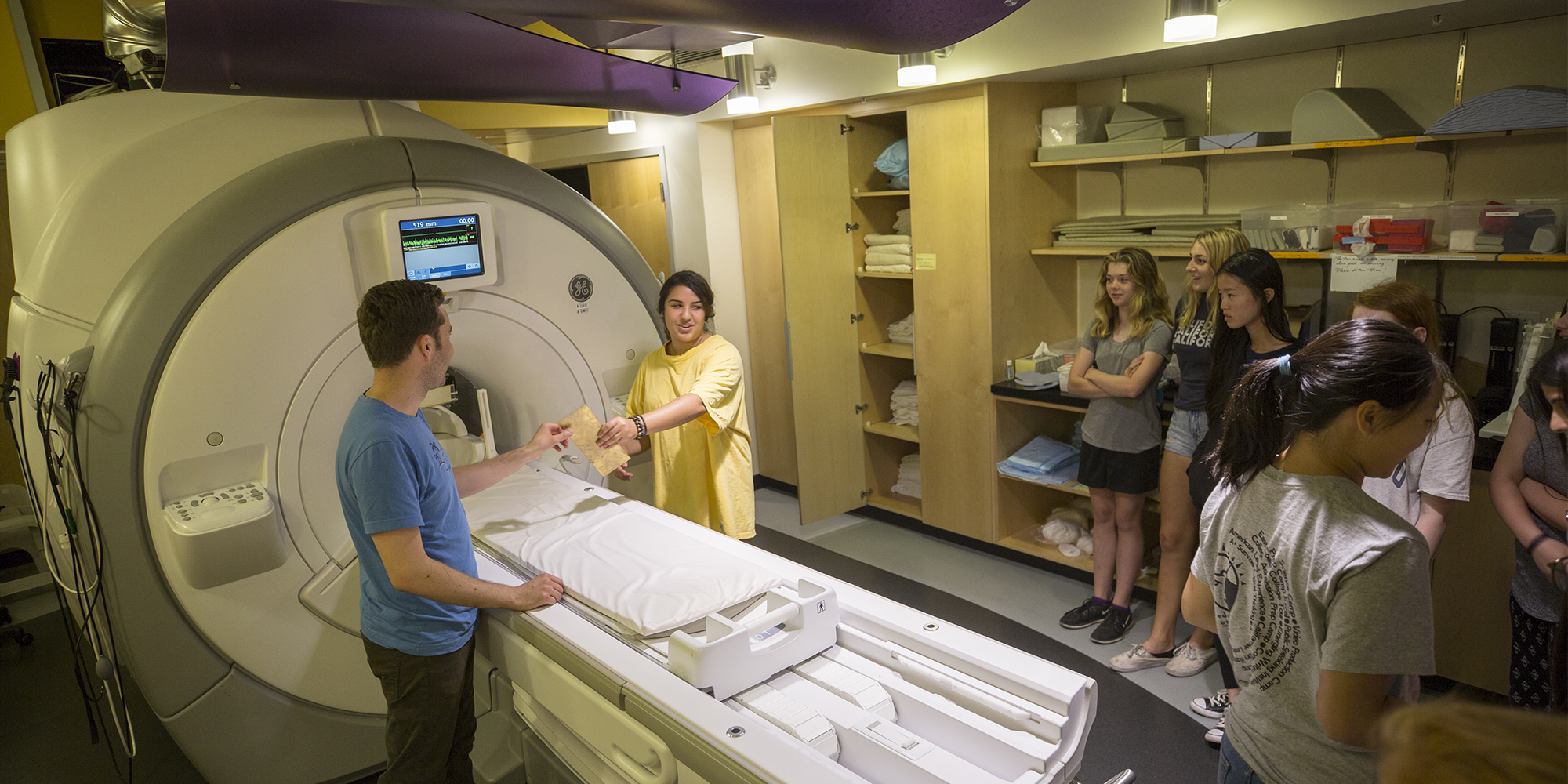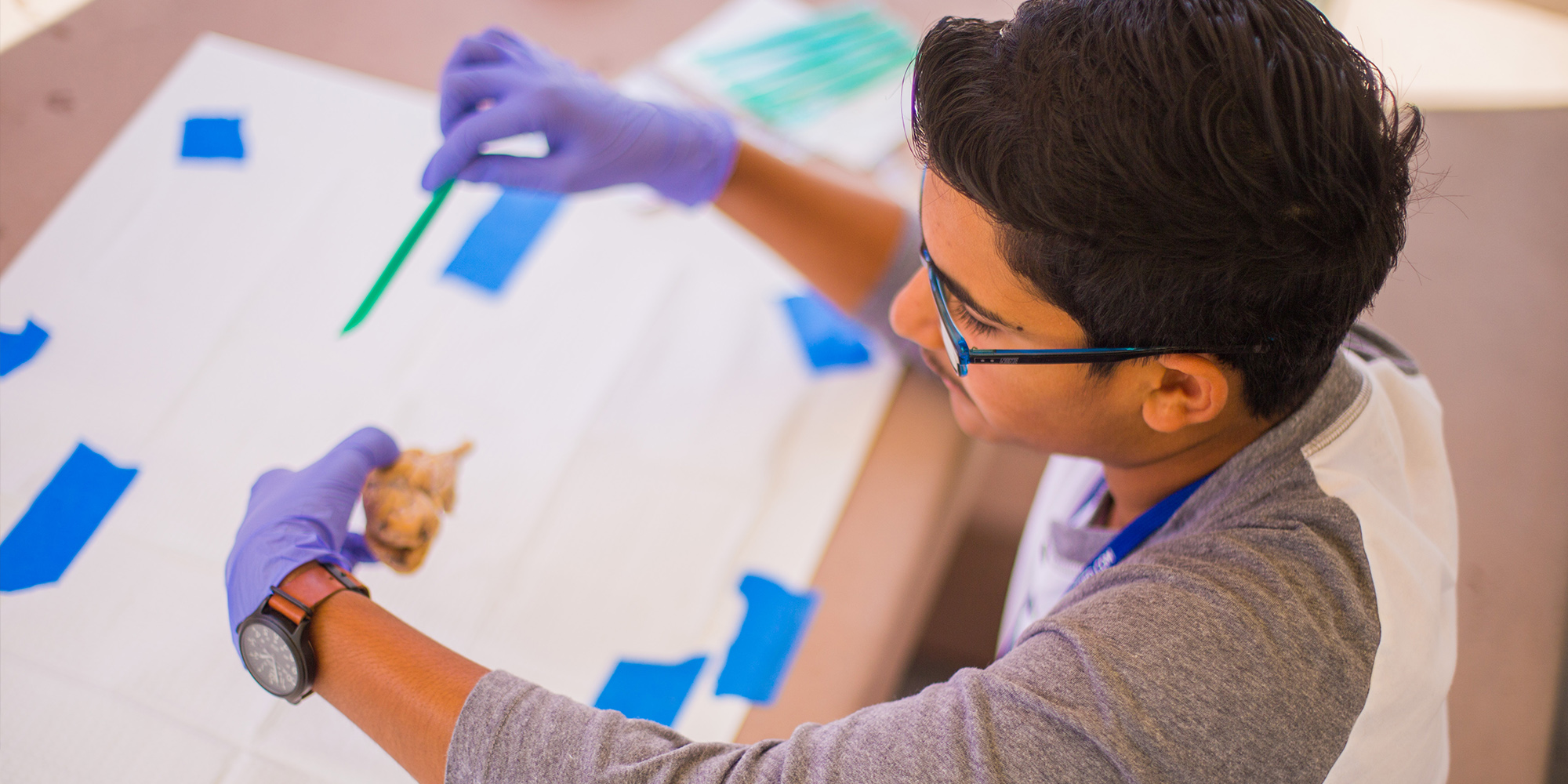In Neuroanatomy, students will learn the basic cell biology of a neuron and how neurons work together. Students will then apply that understanding to the anatomy and physiology of various systems in the brain in the context of fictitious neurological patients. Specifically, we will focus on the cerebral cortex, various subcortical structures, and the visual system.
This course is interactive, uses videos and images and, most importantly, includes hands-on activities such as building model systems using Play-doh or Model Magic, dissecting a sheep brain, and engaging in lab activities and demos in order to explore neuroanatomy from a variety of viewpoints.
The culminating event on Friday will be case-studies presentations where students adopt the roles of neurologists, psychiatrists, and/or neuroradiologists to give a Grand Rounds-style presentation to the class focused on a particular patient.
Click the tabs below to learn more about this program.
Our courses are interactive, use videos and images and, most importantly, include hands-on activities such as building model systems using Play-doh or Model Magic, dissecting a sheep brain, and engaging in lab activities and demos in order to explore the neuroanatomy of the visual system, somatosensory systems, and the motor systems. Campers will get to research various local labs prior to the Wednesday field trip, which will include touring a neuroimaging facility and a neuroscience lab, guest lectures by the researchers in those labs, and several Q&A sessions. The culminating assessment will be a partner test on Friday where campers get to diagnose fictitious patients coming to a neurology clinic as well as predict symptoms of a person based on pictures of their brain or spinal cord radiographic images.
On the last day of camp, parents will rotate to various stations staffed by the campers to experience some of the activities and labs for themselves, and then be taught neuroanatomy by the campers.
Minors: In addition to the "Major" activities, students participate in “Minor” labs that allow them to gain a breadth of scientific knowledge by exploring different scientific disciplines. These may include activities such as extracting the DNA of a strawberry or delving into forensic science with blood type analysis.
Enrichment Activities: In addition to classtime, campers will be given the opportunity for informal science learning, as well as leadership and problem-solving training through workshops, experiments, guest speakers, and recreational activities.
For online camps, students are mailed a box of lab materials so that they can do all of the labs synchronously with their instructor and classmates. This includes a sheep's brain and dissection kit for the final dissection. Lab materials cost are included in the camp price.
| Program | Grades | Location | Start Date | End Date | Price Options | Register |
|---|---|---|---|---|---|---|
| Neuroanatomy 9th-12th | 9 - 11 | UC Berkeley | Jun 21, 2026 | Jun 27, 2026 | Enroll | |
| Neuroanatomy 9th-12th | 9 - 11 | Stanford University | Jul 5, 2026 | Jul 11, 2026 | Enroll | |
| Neuroanatomy 9th-12th | 9 - 11 | UCLA | Jul 12, 2026 | Jul 18, 2026 | Enroll | |
| Neuroanatomy 9th-12th | 9 - 12 | Online | Jul 13, 2026 | Jul 17, 2026 | Enroll | |
| Neuroanatomy 9th-12th | 9 - 12 | Stanford University | Jul 26, 2026 | Aug 1, 2026 | Enroll |
Price Options for Neuroanatomy 9th-12th
| Extended Day Camp | $2,985 |
| Overnight Camp | $3,495 |
Price Options for Neuroanatomy 9th-12th
| Extended Day Camp | $2,985 |
| Overnight Camp | $3,495 |
Price Options for Neuroanatomy 9th-12th
| Extended Day Camp | $2,985 |
| Overnight Camp | $3,495 |
Price Options for Neuroanatomy 9th-12th
| Day Camp | $1,095 |
Price Options for Neuroanatomy 9th-12th
| Extended Day Camp | $2,985 |
| Overnight Camp | $3,495 |
Don’t see a class you want in your time zone? Check other time zones to flexibly fit your needs!
| Click Here to View Sample ON-CAMPUS Schedule | Click Here to View Sample ONLINE Schedule |
Education Unlimited believes in small-group, immersive learning with subject matter experts and experienced teachers. We strive to provide industry-leading instruction to all of our students and hold all staff to the highest possible standards. Staff assignments vary by program and location. Some of our recent staff members for this program include:
Jennifer Brakeman, PhD - Instructor
Dr. Brakeman is a dedicated high school science teacher who holds a Ph.D. in Neuroscience from Johns Hopkins University. For more than 20 years, she has been one of the most beloved teachers at the prestigious Head Royce school in Oakland, CA. During her tenure at the school, she has taught 9th-grade physics, 11th-grade Biology and AP Biology, 12th-grade Neurobiology and 12th-grade Molecular Genetics.
In addition to her teaching responsibilities, Dr. Brakeman has also coached the swim team, been an active member/advisor of the student Green Team and the school's Green Council, lead the school’s Boot Camp PE class, and has been the Science Department Chair since 2008. She feels incredibly fortunate to be able to teach the subjects she has a passion for, to students who love to learn, in a supportive and creative environment. Dr. Brakeman has been a member of the Education Unlimited team since 2015.
Cellas Hayes, PhD - Instructor
Dr. Hayes is currently a postdoctoral fellow/Propel scholar at Stanford University in the Department of Neurology and Neurological Sciences in a laboratory utilizing longitudinal data analysis and neuroimaging modalities to understand the aging brain, neuropathology, cognition, and Alzheimer’s Disease. Postdoctoral experience includes using R, Linux, and Python to perform data preprocessing, multivariate statistical analysis, and applying novel models for longitudinal continuous outcomes. He received his Bachelor’s in Biology (2015-2019) and Doctor of Philosophy in Pharmaceutical Sciences with an emphasis in Pharmacology (2019-2022) from the University of Mississippi. As a doctoral candidate, his research focused on using both in vitro and in vivo approaches to further elucidate how neuroendocrine modulation specifically insulin-like growth factor-1 alters learning and memory performance along with ischemic stroke outcomes. Skills gained during doctoral training included in vitro cell culture, pharmacological experimental design of both in vitro and in vivo studies, development of transgenic mouse models, a wide array of rodent behavioral paradigms, stereotaxic surgery, photothrombosis, and numerous ex vivo cellular, molecular, and microscopy techniques
Dr. Hayes' primary interests lie at the intersection of aging, neurodegenerative disease, and using longitudinal epidemiological data sets to investigate hypotheses. All around neuroscientist seeking sci-comm, industry, and academic opportunities to strengthen skills to become an independent investigator.
Grant Walker, PhD - Instructor
Grant M. Walker, Ph.D., is a Project Scientist in the Auditory and Language Neuroscience Lab at the University of California, Irvine. He received a B.A. in Cognitive Science and Communications from the University of Pennsylvania, and a Ph.D. in Psychology, as well as an M.S. in Cognitive Neuroscience, at the University of California, Irvine. His research is focused on understanding the mechanisms that support speech and language functions, how these mechanisms are impaired by brain injury, and how best to repair them. The methods typically involve the development of computational models to extract meaningful measures of latent cognitive abilities from behavioral tests and neuroimaging data.
Sarah Leinwand, PhD, Instructor
Dr. Sarah Leinwand obtained her B.A. in the Biological Basis of Behavior at the University of Pennsylvania and her Ph.D. in Neurosciences at the University of California, San Diego. Sarah was a Postdoctoral Fellow at the University of California, Berkeley in the Department of Molecular and Cell Biology. Her research has investigated brain development and the neural basis of behavior. She has published and received multiple grants for her work examining how circuits in the brain control smell, taste, and learning abilities across the lifespan. She has taught Exploring the Brain: Introduction to Neuroscience at Berkeley, several introductory neuroscience courses for advanced high school students, and mentored high school, community college, and undergraduate students in the laboratory. Sarah is passionate about STEM education and looks forward to training the next generation of scientists, doctors, and citizens.
Paloma Santos, Instructor
Paloma Santos is a PhD student in UC Berkeley’s School of Information whose work bridges cognitive science and technology. She holds a BS in Cognitive Behavioral Neuroscience from UC San Diego and an MA in Psychological Science from CSU Northridge, where she earned the program’s Outstanding Graduate Student Award in recognition of both her research productivity and teaching excellence. Her prior projects span EEG studies of visual memory, augmented-reality guidance for real-world visual search, and citizen-science platforms that gamify technology-ethics research. Beyond her academic pursuits, she finds solace and rejuvenation in yoga, skiing, dancing, running, and exploring with friends.
Jessica Weiss, Instructor
Jessica Weiss is a dedicated physician assistant student at Stanford University. She earned her undergraduate degree in neuroscience from the University of California, Santa Barbara (UCSB). Prior to her studies at Stanford, Jessica gained extensive medical experience working as a medical scribe in the emergency room and as a medical assistant for an orthopedic surgeon. Jessica's commitment to community service is demonstrated by her significant involvement with Doctors Without Walls Santa Barbara Street Medicine, where she held two leadership positions. In this role, she led a team of volunteers, providing essential medical care and resources to unhoused individuals throughout Santa Barbara. Additionally, during her time at UCSB, Jessica volunteered with Kids in Nutrition, teaching first graders valuable lessons about nutrition. In her free time, Jessica enjoys spending time outdoors, whether at the beach, hiking, or walking her dog.

